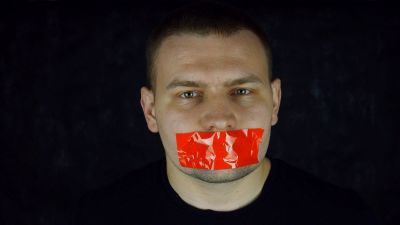Why we don't want Europe-style free speech in America

Late last year at Yale Law School, native American law student Trent Colbert became the latest victim of cancel culture and the woke mob. Trent is part of the Yale Native American fraternity “NALSA.” He sent an invitation to fellow law school friends to join him in a party of both NALSA and the Federalist Society. His email invitation was benign but included the term “trap house,” which subsequently caused a firestorm of condemnation.
Trent described attacks he immediately received: “Barely 12 hours after I sent the invitation, two discrimination and harassment coordinators from the Law School’s Officer of Student Affairs scheduled a meeting with me … repeatedly urged me to issue a public apology.” The woke officials warned things would “escalate.” According to Trent, “I was told my use of the term ‘trap house’ indicated ‘inherently anti-Black sentiment.’ As a Gen-Zer, I’ve always known ‘trap house’ to be synonymous with ‘party house’ ... the popular understanding of ‘trap house’ in no way suggests it is a racial slur.”
The discrimination coordinators quickly sent an email to Trent’s entire law school class “condemn(ing) in the strongest possible terms” Trent’s “pejorative and racist language.” Yes, this is the same Yale in which a speaker told students in April she “fantasizes about shooting white people in the head.” This is but one of the examples of woke attacks on free speech, while progressives increasingly exhort us to follow European-style censorships.
The progressive call for implementing Europe’s brand of censorship was probably best summed up in The New York Times essay by Emily Bazelon. In it, Bazelon marginalized the traditional “article of faith in the United States … that the government should regulate it as little as possible.” She then claimed, “the way we have come to think about the First Amendment guarantee of free speech … our formulations are simplistic — and especially inadequate for our era.” Bazelon went on to offer a better alternative: “Other Democracies, in Europe and elsewhere, have taken a different approach. Despite more regulations on speech, these countries remain Democratic...”
It’s important to understand what most Europeans use as authority for free speech “rights.” Member states of the European Union follow Article 10 of the “Convention of Human Rights” for determining limits on free speech. Unlike the clear First Amendment language of “Congress shall make no law” infringing free speech, Article 10 allows for restriction of speech by the government. It uses terms as vague as “health and morals” to allow for those restrictions.
In my experience of living in Europe for many years, I found the European value of free speech to be quite distinct from America’s. Generally, Europeans will agree that people should have freedom of speech but admit that it is not an unqualified right. Government, many argue, may censor for the perceived collective good. In various places in Europe, like Finland, this means that quoting from the Bible about sexuality can bring felony prosecution as hate speech.
During a Pew Research poll of the six primary European Union members, almost half of the respondents were not opposed to censoring speech that might be found offensive, including 70% of Germans and 62% of Italians. A primary argument for censoring “hate” speech in Europe is preventing Fascism, Nazism, and the Holocaust. Ironically, history gives the opposite conclusion. As Danish newspaper editor Flemming Rose has written: “I found that, contrary to what most people think, Weimar Germany did have hate-speech laws, and they were applied quite frequently ... leading Nazis such as Joseph Goebbels, Theodore Fritsch and Julius Streicher were all prosecuted for anti-Semitic speech … rather than deterring ... the many court cases served as effective public-relations machinery ... the courts became an important platform for Streicher’s campaign against the Jews.” Trying to suppress speech is much less effective than illuminating and debating it.
Progressives have pushed their favored European model of censorship through woke indoctrination, as with the examples like Trent Colbert and with the arguments of Emily Bazelon. With the continual propaganda in favor of hate speech censorship, from Democratic politicians, mainstream media, and academia, our American values have been under constant assault. As author and senior writer for National Review, David Harsanyi, has written, “Polls, alas, also show an increasing openness to hate speech laws in the United States. A recent survey found that 40% of millennials are okay with limiting speech offensive to minorities. Another found 50% of Democrats have warmed to the idea of banning ‘hate speech’.” Democratic politicians have attempted to use scare tactics of a domestic extremism danger or public health disinformation to censor speech they disfavor.
Autocracies show that when speech is censored, all other rights quickly dissolve. That is our direction now. After Jesus was crucified, the Apostles Peter and John were ordered by the ruling authorities not to speak in His name (Acts 4). Their reply is one of the earliest examples of pushback against censorship. An example we should follow now: “Whether it is right in the sight of God to listen to you rather than to God, you must judge, for we cannot stop speaking about what we have seen and heard.”
Freedom of speech is at the heart of being a Christian and an American. We cannot give it up.
Bill Connor, a retired Army Infantry colonel, author and Orangeburg attorney, has deployed multiple times to the Middle East. Connor was the senior U.S. military adviser to Afghan forces in Helmand Province, where he received the Bronze Star. A Citadel graduate with a JD from USC, he is also a Distinguished Graduate of the U.S. Army War College, earning his master of strategic studies. He is the author of the book Articles from War.




























